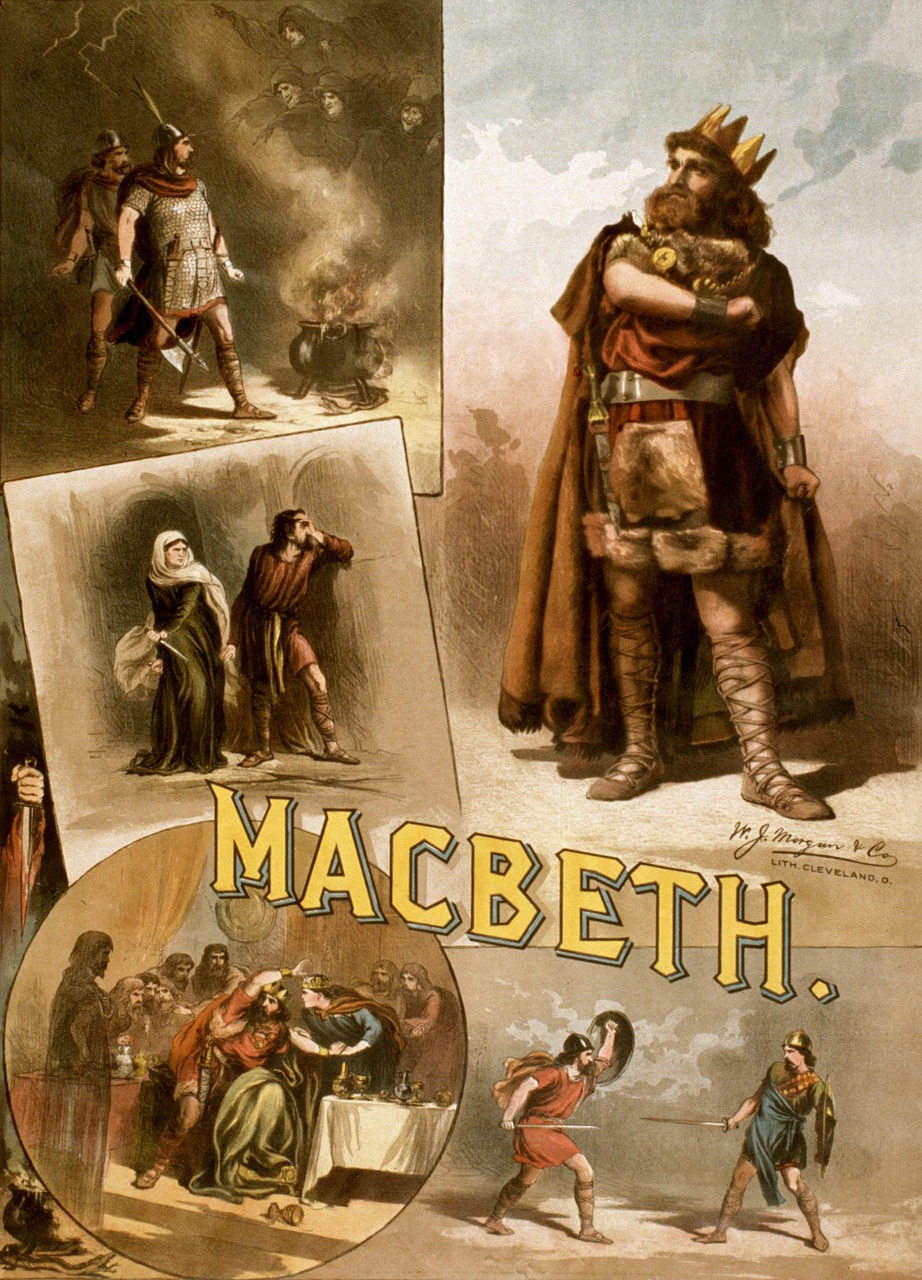Macbeth: The Themes
William Shakespeare is regarded by many as the greatest writer in the English language and his celebrated work, ‘Macbeth’ is often acclaimed as his greatest work.
A dark and tragic story but also extremely rich in its exploration of the grimmer and more unpleasant aspects of human nature, the story still continues to enthral and captivate readers to this day.
In this article, which will be the first in a series of articles on both the themes and characters of the play, we will be looking at the main themes of this story.
Power and ambition
When reading Macbeth one has to bear in mind the wider context that the play was written in and the fact that the previously king of Scotland had moved down to London and become king of England at the request of the English nobility. Shakespeare could not write a play which would show someone overthrowing a king being successful with this in the long run. In contrast the onus would be on him to show the long term futility of doing such a thing.
Power can be of great allure to many. Along with the actual power, the control over others and resources, is the accompanying status that it brings. That status inspires ‘respect’, though arguably some of that ‘respect’ is false and is respect of the position not the person thus when the person no longer has that position he is no longer respected by others, with only his true close friends and family who love him regardless of his status staying close to him.
Macbeth is a valiant Scottish warrior and fighter and seen as noble in character. It is unfortunately this nobility which is not just tainted but destroyed due to his lust for power, his desire to be king, but at what expense? He compromises his moral principles and friendship first to gain the crown and then to keep it. Power in itself does not guarantee happiness and can bring lots of complications in contrast to living a simple quiet life. After killing the king Duncan then Macbeth feels compelled to kill more and more, a once brave soldier who fought his fellow strong manly warrior opponents openly in the battlefield, treacherously and deceitfully murders people behind the scenes.
Those who would have watched the play during the time of King James I would have felt that rebellion against a king was wrong and would result in long-term failure and misery. They would also know that power in itself is not a guarantee of ultimate fulfilment and happiness. Ambition can be dangerous. ‘Not all that glitters is gold’ as the old English saying goes.
Struggle between morality and immorality / Strength
Macbeth is a good man in the beginning of the play and respected. The witches with their prophesies of his impending kingship contribute to propelling him to carry out actions which he would never have dreamed of before including killing the king, the guards, Banquo and lady Macduff and her children, an orgy of bloodshed. He is pushed on to murder the king by his wife who he informs of the prophesies he receives from the three witches.
The witches in the play had told him that he would become Thane of Cawdor (Thane was a title and rank amongst the Scottish nobility at that time) and then king but also add that his friend Banquo will see his descendants be king but not be king himself. It is ultimately this prophesy which destroys Macbeth and the destructive and malignant nature of the witches and their prophesies as depicted in the play would very much have appealed to King James I at the time who was a keen ‘witch-hunter’ and hated ‘witches’ so much that he published books and passed a very harsh law against witchcraft in 1604 in England.
Macbeth is unable to psychologically resist the strong pressure from his wife to kill Duncan. He is of course more than physically able to subjugate his wife who is physically weaker, but the irony is that despite his great physical strength Macbeth can be argue to be mentally very weak. He can resist the ferocity of soldiers on their battlefields whipping their swords and axes with brute strength amidst blood flowing, guts and body parts flying here and there and a horrific scene of corpses lying on the ground.
Despite all this warrior strength and ability to withstand the swords and axes of tall, strong men, Macbeth is not able to resist the tongue of lady Macbeth and her insults including her challenging his manhood. A stronger man would have, a stronger man would have forcefully told her that he would not commit a grossly immoral act, and an act which was seen at that time as bordering on virtually being sacrilege (an act which insults religion, in those times the king was seen as being chosen by God and to disrespect him was to disrespect divine will).
Macbeth thrives on the physical battlefield of soldiery but he fails miserably on the battlefield of normal life.
His physical military strength contrasts with his weakness in his domestic life to his wife who is stronger than him and can force him to do her bidding.
Strength is of different types including physical, mental, intellectual and that is very much evident in the play.
There is a struggle between morality and immorality with Macbeth initially rejecting the idea of murdering Duncan. However this once brave and noble soldier fails in persisting in being morally right and does what his wife tells him to. Macbeth represents morality and Lady Macbeth represents immorality, a ying and yang type relationship with the darker side prevailing in the end but ultimately for this all to end in ruin with Lady Macbeth’s suicide which was caused due to mental illness caused by the guilt of all the blood she had caused.
For those watching Macbeth at the time in London they would have felt that:
1. witchcraft is evil and dangerous and needs to be punished severely and would have supported King James’ strong law against it in 1604.
2. Rebellion against the king is wrong and will result in karmic failure and punishment.
3. That immorality does not pay and it is better to do the right thing e.g. in the context of the play for Macbeth to have been happy with the title the king had given him and not murder the king.
Summary.
These are two of the main themes of the play but there are others such as gender as featured in the play which we shall discuss in more depth in future articles.
Important vocabulary useful for exams are:
- Morality
- Immorality
- Amoral – e.g. ‘Lady Macbeth can be said to be amoral (without any morals) especially highlighted by her horrific claim she would have dashed her new born baby’s brains against the walls if she had sworn to rather than fail to keep her promise’.
- Malignant – evil, causing harm e.g. the witches.
- Malevolent – evil and causing suffering e.g. the witches.
- Uncertainty – Macbeth is uncertain at first whether to kill Duncan.
- Supernatural – as in the form of the witches.
- Sacrilege – an act of sacrilege is to do something against religion e.g. to defile a holy book.
- Karma – the belief that what goes round comes around and ultimately evil is punished with bad things befalling the evil doer.
- Allure – the attraction of something.
About English Made Simple

English Made Simple is a website dedicated GCSE English, IELTS Preparation and other things providing useful content to readers all across the world on how to improve their English




